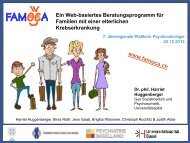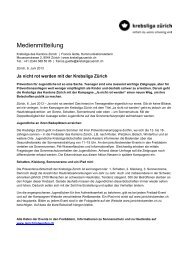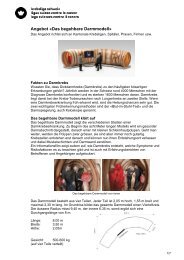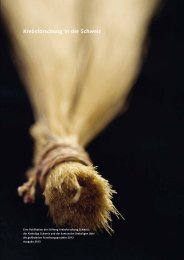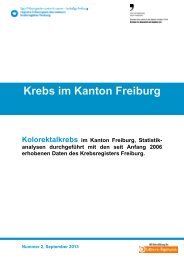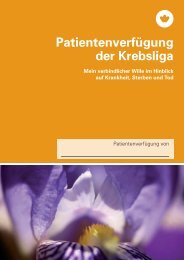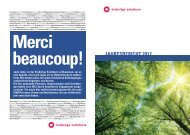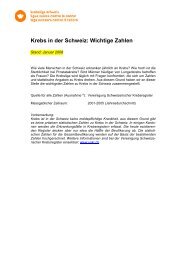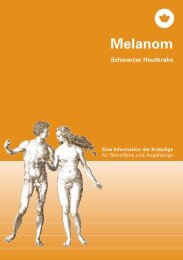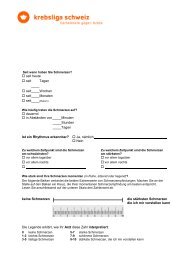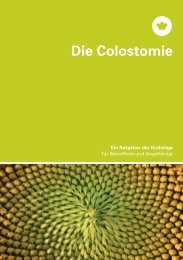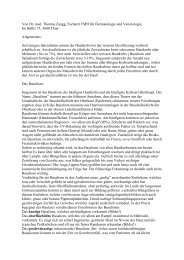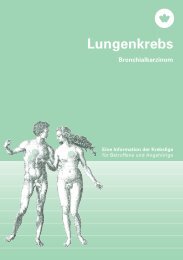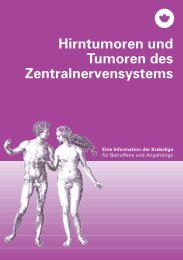Cancer Research in Switzerland - Krebsliga Schweiz
Cancer Research in Switzerland - Krebsliga Schweiz
Cancer Research in Switzerland - Krebsliga Schweiz
You also want an ePaper? Increase the reach of your titles
YUMPU automatically turns print PDFs into web optimized ePapers that Google loves.
164<br />
Nadal David | Is endemic Burkitt’s lymphoma really<br />
promoted by chronic <strong>in</strong>nate immunity trigger<strong>in</strong>g by<br />
malaria <strong>in</strong>fection? (KLS 02375-02-2009)<br />
Duration: 01.10.2009 – 01.10.2011<br />
Endemic Burkitt’s lymphoma (BL) is a type of lymph node<br />
cancer <strong>in</strong> Africa. The cancer cells harbour Epste<strong>in</strong>-Barr<br />
virus (EBV), which <strong>in</strong>fects over 90 % of children for a lifetime.<br />
Malaria is thought to contribute to the formation of<br />
this cancer type. We have shown that stimulation of the<br />
<strong>in</strong>nate immunity, as malaria does, pushes EBV <strong>in</strong>to a form<br />
that enables lymphocytes to cont<strong>in</strong>uously proliferate.<br />
We will study the impact of immune stimulation on the<br />
preservation of EBV’s form, lead<strong>in</strong>g to survival and unrestricted<br />
proliferation of cells. Newly ga<strong>in</strong>ed <strong>in</strong>sights <strong>in</strong>to<br />
the <strong>in</strong>teraction between chronic stimulation of the <strong>in</strong>nate<br />
immunity and the behaviour of EBV-<strong>in</strong>fected cells towards<br />
cancer will hopefully allow the eng<strong>in</strong>eer<strong>in</strong>g of novel modalities<br />
for prevention and treatment of EBV-harbour<strong>in</strong>g<br />
lymphomas.<br />
Project coord<strong>in</strong>ator<br />
Prof. Dr. David Nadal<br />
Abteilung Infektiologie und Spitalhygiene<br />
K<strong>in</strong>derspital Zürich<br />
Universitäts-K<strong>in</strong>derkl<strong>in</strong>iken<br />
Ste<strong>in</strong>wiesstrasse 75<br />
CH-8032 Zürich<br />
Phone +41 (0)44 266 72 50<br />
Fax +41 (0)44 266 80 72<br />
david.nadal@kispi.uzh.ch<br />
Niggli Felix | Constitution of a national study centre<br />
for the European acute lymphoblastic leukaemia trial<br />
(AIEOP-BFM ALL 2009) on behalf of the Swiss Paediatric<br />
Oncology Group (BFM-CH) (KLS 02578-02-2010)<br />
Duration: 01.06.2010 – 01.06.2013<br />
Acute lymphoblastic leukaemia (ALL) is the most common<br />
malignancy of childhood. Remarkable progress has been<br />
made <strong>in</strong> the past decades. Comb<strong>in</strong>ation treatment with <strong>in</strong>tensive<br />
multi-agent chemotherapeutic regimens, adapted<br />
to biological factors like response to treatment, cytogenetic<br />
changes <strong>in</strong> leukaemic cells and m<strong>in</strong>imal residual disease<br />
after <strong>in</strong>itial treatment phase has raised the cure rate<br />
of the disease to over 80 %. However, treatment burden<br />
is still considerable. An <strong>in</strong>ternational consortium established<br />
a new treatment protocol (AIEOP-BFM ALL 2009<br />
trial) with risk adapted treatment application, tak<strong>in</strong>g also<br />
<strong>in</strong>to account early response assessment. With<strong>in</strong> the Swiss<br />
Paediatric Oncology Group we will establish a national<br />
study centre for ALL to coord<strong>in</strong>ate relevant diagnostic<br />
procedures and to perform reference <strong>in</strong>vestigation, data<br />
collection and coord<strong>in</strong>ation of research. We hope to further<br />
improve the survival rate for childhood ALL and to<br />
decrease side effects, at least <strong>in</strong> subgroups of patients.<br />
Project coord<strong>in</strong>ator<br />
Prof. Dr. Felix Niggli<br />
Onkologielabor<br />
K<strong>in</strong>derspital Zürich<br />
Universitäts-K<strong>in</strong>derkl<strong>in</strong>iken<br />
Ste<strong>in</strong>wiesstrasse 75<br />
CH-8032 Zürich<br />
Phone +41 (0)44 266 71 11<br />
felix.niggli.@kispi.uzh.ch<br />
Ozsah<strong>in</strong> Hulya | SIOPEL International Childhood Liver<br />
Tumour Strategy Group – a comprehensive research<br />
program and a randomized trial for standard risk<br />
hepatoblastoma (KLS 02656-08-2010)<br />
Duration: 01.10.2010 – 01.10.2013<br />
SIOPEL (Société <strong>in</strong>ternationale d’oncologie pédiatrique –<br />
Epithelial Liver Tumour Study Group) is a trials group for<br />
research on the diagnosis, treatment and long-term outcome<br />
of childhood hepatoblastoma (HB) and hepatocellular<br />
carc<strong>in</strong>oma. These cancers are extremely rare, with<br />
about 1.5 cases per million per year. The Swiss Paediatric<br />
Oncology Group (SPOG) has participated <strong>in</strong> SIOPEL trials<br />
1– 4 and is activat<strong>in</strong>g SIOPEL 6 <strong>in</strong> <strong>Switzerland</strong>. SIOPEL 6 is<br />
a multi-centre randomised phase III trial of the efficacy of<br />
sodium thiosulphate <strong>in</strong> reduc<strong>in</strong>g hear<strong>in</strong>g loss with cisplat<strong>in</strong><br />
chemotherapy for standard risk HB. The cont<strong>in</strong>ued<br />
participation of SPOG <strong>in</strong> SIOPEL activities and research<br />
will result <strong>in</strong> optimal treatment of children with HB.<br />
Project coord<strong>in</strong>ator<br />
Prof. Dr Hulya Ozsah<strong>in</strong><br />
Unité d’onco-hématologie pédiatrique<br />
Hôpitaux universitaires de Genève (HUG)<br />
6, rue Willy-Donzé<br />
CH-1211 Genève 14<br />
Phone +41 (0)22 382 46 20<br />
Fax +41 (0)22 382 47 20<br />
ayse.h.ozsah<strong>in</strong>@hcuge.ch<br />
Pabst Thomas | Transcriptional dysregulation of<br />
the myeloid key transcription factor CEBPA <strong>in</strong> human<br />
acute myeloid leukemia (KLS 02520-02-2010)<br />
Duration: 01.07.2010 – 01.07.2013<br />
Despite <strong>in</strong>tensive chemotherapy, more than 50 % of patients<br />
with acute myeloid leukemia (AML) still die of the<br />
disease. To improve the treatment of patients with AML,<br />
novel <strong>in</strong>novative concepts are needed. The concept of differentiation<br />
therapy offers a possible approach. The block<br />
<strong>in</strong> normal differentiation of white blood cells is characteristic<br />
for AML cells. Importantly, each step dur<strong>in</strong>g differentiation<br />
of normal white blood cells is regulated by only a<br />
handful of transcription factors. In particular, the transcription<br />
factor CEBPA plays a key role <strong>in</strong> this process. If<br />
CEBPA function is deficient, no mature granulocytes are<br />
observed, and this leads to an accumulation of leukaemic<br />
blasts.<br />
In this project, we analyze how CEBPA prote<strong>in</strong> expression<br />
is regulated <strong>in</strong> leukaemic cells. Further, we aim to elucidate<br />
how CEBPA controls a new class of regulat<strong>in</strong>g molecules<br />
called microRNAs. Through specific reconstitution<br />
of CEBPA function, we <strong>in</strong>tend f<strong>in</strong>ally to develop a novel<br />
therapeutic approach for patients with AML.<br />
Project coord<strong>in</strong>ator<br />
Prof. Dr. Thomas Pabst<br />
Institut für mediz<strong>in</strong>ische Onkologie<br />
Universität Bern<br />
Inselspital<br />
CH-3010 Bern<br />
Phone +41 (0)31 632 41 15<br />
Fax +41 (0)31 632 41 19<br />
thomas.pabst@<strong>in</strong>sel.ch



